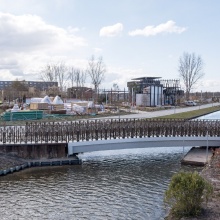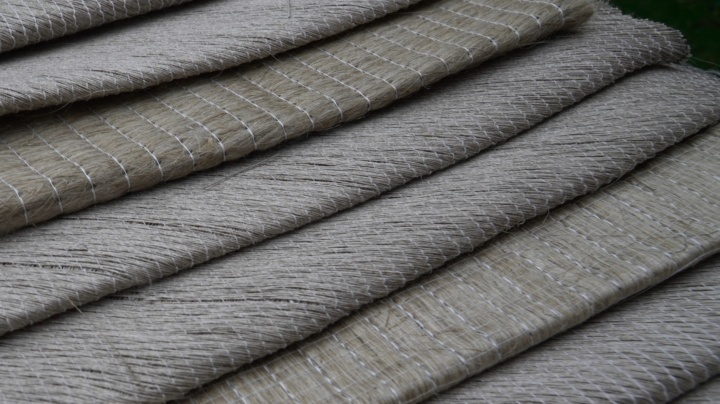An old material is being rediscovered: flax has been with us for thousands of years in the form of clothing, sacks, and robust ship's ropes. Now the plant fibres are experiencing a renaissance and could become the building material of the future. Combined with a special bio-resin, it can be made into a light and highly stable material with properties comparable to aluminium or steel. The EU project "Smart Circular Bridge" shows what is possible with this innovative new material: via the development of three bridges from this so-called bio-composite. A first one has now been built, and two more will follow.
Junior professor Hanaa Dahy from the University of Stuttgart is involved in the project. As head of the research group for Biobased Materials and Materials Cycles in Architecture (BioMat), she specializes in building with bio-based materials. She was able to use this expertise in the development of this high-tech bridge made of flax: "The entire project provides an important impetus for how alternative, biomass-based and annually renewable resources can be used in the construction industry. With the help of these resources, we aim to overcome major challenges such as high CO2 emissions and high energy consumption in the production of building materials."
In times of climate change and dwindling raw materials, bio-composites offer a great opportunity for the construction industry with its huge CO2 footprint and immense consumption of resources. They hold enormous potential for a bio-based circular economy, especially since flax, unlike wood for example, is a fast-growing plant.
Interdisciplinary teams drive development
The first "Smart Circular Bridge" with a span of 15 metres has now been realised by an international consortium of 15 partners led by Eindhoven University of Technology in the Netherlands. The project team consists of five universities, seven innovative companies, and three municipalities. The first bridge set up at the Floriade international horticulture exhibition in Almere, Netherlands will open April, 22. Two more “Smart Circular bridges” for pedestrians and cyclists will be built in Ulm, Germany and Bergen op Zoom, Netherlands later in 2022 and in 2023 respectively. Through this intensive cooperation between science, industry, and local authorities, a multitude of innovations is launched.
The first "Smart Circular Bridge" with a span of 15 metres has now been realised by an international consortium of 15 partners led by Eindhoven University of Technology in the Netherlands. The project team consists of five universities, seven innovative companies, and three municipalities. The first bridge set up at the Floriade international horticulture exhibition in Almere, Netherlands will open April, 22. Two more “Smart Circular bridges” for pedestrians and cyclists will be built in Ulm, Germany and Bergen op Zoom, Netherlands later in 2022 and in 2023 respectively. Through this intensive cooperation between science, industry, and local authorities, a multitude of innovations is launched.
Apart from the 100% natural flax fibers, the resin will also come from non-fossil sources as much as possible. The proportion of bio-resin is 25% for the first bridge, but it will reach 60% or more for the next bridges. This is achieved by using waste products from bio-diesel production and recycled PET bottles.
Accelerating materials research with AI
As bio-composites offer great opportunities, research on the materials is continuously ongoing. This is why the bridges are systematically monitored in real time. Almost 100 sensors in the bridge provide data on the material's behaviour in everyday use. How does the structure behave when 200 people walk over it at the same time? What happens in different seasons, during storms, hail, and snow? How does the ageing process of the material take place?
A Structural Health monitoring system with optical glass fibre sensors in the bridge provide information on material strains, and acceleration sensors detect even the finest vibrations caused by wind. Evaluation of data from the sensors is carried out with the help of artificial intelligence (AI) to recognise patterns in material behaviour. The data can be viewed on a dashboard on a public website. At the same time, engineers can refine their calculation and material models with this data. On this basis, they will further develop materials and design models for the next bridges and many other applications. Currently, teams are already researching columns and façade elements. Rotor blades from wind turbines are also conceivable.
Designing today for the end of life
With the circular economy in mind, the project is investigating which options are open for the building material after the bridges have reached the end of their life after many decades. Currently, three possibilities are conceivable: mechanical, chemical, and even biological recycling with fungi. It is important that the material's usage cascade lasts as long as possible. To achieve this, the end-of-life options have to be taken into account right from the start of project.
The EU project "Smart Circular Bridge" is about much more than bridge construction. It is a vivid example of how innovations for climate protection and circular economy can successfully be initiated. In the case of bridges alone, it is worth considering alternative materials, as tens of thousands of bridges have to be replaced in Europe over the coming years.
| Contact | Public Relations: |
|---|
Expert Contact:
Junior Professor Hanaa Dahy, BioMat Department Director, University of Stuttgart, e-mail, phone.: +49 711 685 83274
TU/e Eindhoven University of Technology, Prof. Rijk Blok and Angela Looymans, e-mail
Press Conference
We cordially invite you to the Smart Circular Bridge online press conference on April, 20 at 10 am (in English).
Please register by mail informally, Phone number: +49 7071 23416
Opening Event April 22
We kindly invite you to the "Smart Circular Bridge" opening event on 22 April 2022, from 1 to 3 pm, in Almere, Netherlands, on the exhibition area of Floriade Expo (Arboretum West 98, 1325 WB Almere). The programme:
- Ank Bijleveld-Schouten, Mayor of Almere, Netherlands: Opening speech
- Rijk Blok, Eindhoven University of Technology: The "Smart Circular Bridge"
- Experience the bridge: Almost 100 sensors record the movements of the guests during the opening event and transmit them in real time to monitors installed on site. This visualizes the vibrations of walking, bouncing, dancing...
- Brief outlook: Latest developments and the next milestones of the three year Smart Circular Bridge project
- Use your chance to talk to the experts of all project partners.
Meeting point: 12:40 pm at AERES University of Applied Science (Arboretum West 98, 1325 WB, Almere).
For those interested, there is the possibility for an informal discussion with the project partners between 10:30 am and 12:30 pm. Please let us know and you will be informed about the details.



